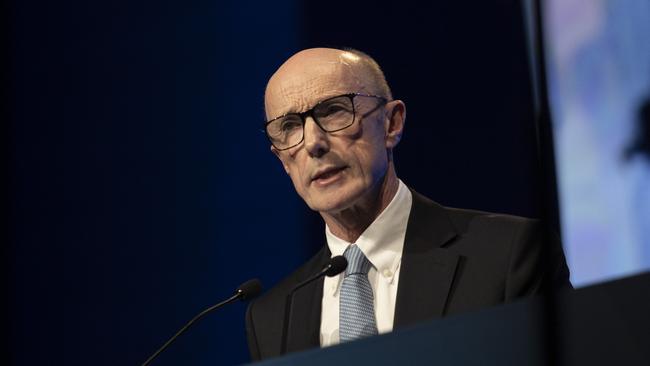Since the tribunal ruling Telstra and TPG have been considering appealing to the full Federal Court to challenge the decision on points of law, but announced on Monday they would not proceed.
Instead both operators are studying a new blueprint, with the prospect of renegotiating the stalled $1.8bn deal that could take the network venture forward without running into competition hurdles. However, any new proposal would still need to go through regulatory scrutiny, and another strong protest from rival telco operator Optus would be likely.
In recent days the competition tribunal quietly released the full reasoning behind its ruling in June that rejected a proposed mobile network-sharing deal between Telstra and third-placed TPG across regional Australia.

That ruling, led by competition tribunal president Justice Michael O’Bryan, upheld the ACCC’s original decision last December that the 10-year agreement would deliver Telstra too many competitive advantages that stand to weaken the position of second-placed telco Optus. While there was an immediate benefit in getting TPG/Vodafone services in regional Australia, this was outweighed by the likely long-term brake on competition, with Optus saying there would be no incentive to invest outside the big cities.
However, it has since emerged in the full findings that the competition tribunal’s decision was “finely balanced” and based on the proposal “in its current form”, and with several modifications to the original agreement it could avoid any major competition issues. In essence the tribunal was suggesting Telstra was getting too much benefit under the existing deal but some of this could be wound back.
Under the proposal, signed in February last year, Telstra and TPG planned to pool network resources in defined rural, regional and remote parts of Australia. This would see TPG get access to more than 3700 Telstra towers.
In return Telstra would get access to TPG’s vast holdings of relatively unused 4G and ultra-fast 5G spectrum, allowing the bigger rival to increase network capacity as well as a portfolio of its mobile towers. At the time TPG argued the move would give it inroads into the regional market and allow it to bundle its own NBN broadband internet offering in the regions.
But the competition tribunal said: “There are a number of ways in which the proposed transaction might be modified by Telstra and TPG in order to avoid any material anti-competitive effects”. This would potentially avoid an arrangement that would “substantially” reduce competition.
Blueprint
Key areas that the tribunal believed should be reconsidered include the level of holdings of spectrum licences that TPG was prepared to fold into the mobile network deal. Also there could be some room around the 169 TPG mobile towers that Telstra was set to gain control of under the agreement. Under the existing deal TPG had then planned to decommission its remaining 580 mobile sites in rural and regional areas which were effectively duplicating the existing Telstra footprint.
A smaller region proposed in the coverage sites would help balance out the potential competition issues.
And finally the 10-year agreement on the deal, with two recurring five-year extension options for TPG, was regarded as too long and could deliver “irreversible” harm to competition.
An agreement of shorter duration would provide a degree of protection against anti-competitive outcomes as well as offer a window for regulators to review the impact of the deal.
Whether or not changes to the agreement were still commercially attractive was a matter for Telstra and TPG, the tribunal said.
However, the tribunal suggested that the two companies should go back to the negotiating table and find a mutually beneficial agreement on a revised deal.
“The tribunal does not consider it to be self-evident that an alternative arrangement could not be mutually beneficial to the parties,” it said in its full decision.
Former Telstra boss Andy Penn took the lead in negotiating the Telstra-TPG network deal, but retired before the regulatory process was finished. Earlier this year new Telstra boss Vicky Brady told a major telco conference in Barcelona that telcos had little choice but to co-operate to help customers connect.

So too, Optus’ world has moved on after last month signing a deal with Elon Musk’s Starlink that would allow customers anywhere in Australia to access the internet and make calls using low orbit satellites from late 2025.
The competition tribunal findings also have significance for banking major ANZ, which in coming weeks is expected to lodge an appeal against the ACCC’s recent decision to block the $4.9bn acquisition of Suncorp’s bank.
The competition tribunal shows that even in the event of a failure to get the current ANZ-Suncorp deal past regulators, there could still be a way forward.
Telstra is scheduled to deliver its full-year earnings results on Thursday. TPG is set to deliver its interim numbers a week later.
The tribunal also expressed some sympathy for the intent of the proposed network-sharing deal between the two telcos, adding the ruling should not be regarded as a permanent roadblock to future network-sharing deals.
Investment in regions in Australia was a challenge for telcos, and often not commercially viable, the tribunal said. This meant that operators were more likely to deploy network investment in metropolitan areas.
Indeed, the tribunal said it considered “there are strong commercial and economic incentives” for telcos to share mobile network infrastructure in regional areas.
“Appropriately structured arrangements are capable of delivering efficiency benefits without substantially lessening competition,” it said.
O’Sullivan’s role
In one twist, one key player has been sitting on both sides of the competition process. Optus’s long-serving chairman Paul O’Sullivan is also chairman of ANZ. It has been in Optus’s interest to argue against a major player Telstra striking a network deal with a distant third player – TPG. And for ANZ the argument runs the other way – a big four bank acquiring a small regional player will mean no competitive detriment.
The two rulings – ANZ and Telstra/TPG – were made within weeks of each other and represent some of the biggest competition rejections in recent years. Each decision still has the potential to reshape respective industries.

O’Sullivan was the former boss of Optus during its furious battles with Telstra during the much of the early 2000s when a land grab was under way for mobile network dominance and the Apple iPhone was starting to change the economics of telcos.
O’Sullivan provided evidence on behalf of Optus in the Telstra-TPG process, but was not involved in ACCC’s review of ANZ’s buyout. Instead the bank’s chief executive Shayne Elliott led the evidence.
In his role as Optus chairman, O’Sullivan told the ACCC that a deal between Telstra and TPG represented a “material risk” to Optus.
The federal government’s ban on the use of 5G equipment from Chinese telco maker Huawei was also set to put Optus at a further disadvantage, he added.
Both Optus and TPG have used Huawei for their 3G and 4G equipment, while Telstra has used long-term supplier Ericsson.
johnstone@theaustralian.com.au






The door remains open, ever so slightly, for a landmark mobile network-sharing deal between Telstra and Vodafone-owner TPG to move ahead, even after being knocked back by the competition regulator and a more recent appeal at the Australian Competition Tribunal.